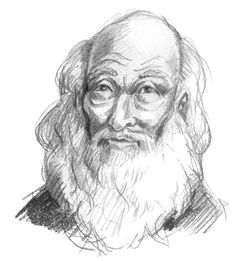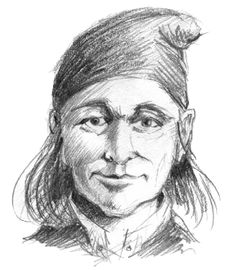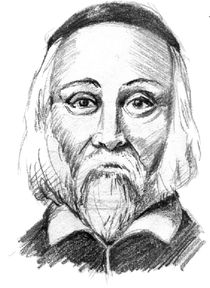How Mrs. Claus Saved Christmas (11 page)
Read How Mrs. Claus Saved Christmas Online
Authors: Jeff Guinn

“That's true,” Nicholas admitted, sitting down in a chair opposite mine. “But we must always be practical, Layla, and though we haven't spoken of it much, these are dangerous times for Christmas in places other than America. That's true in England, especially. My placeâour place, I meanâmay be with Arthur just now, instead of across the Atlantic Ocean. So many things in England have been confused since 1527, when King Henry VIII decided to divorce Princess Catherine of Aragon.”
From the time we first crossed the channel to England in St. Patrick's boat, the country had constantly been ravaged by some sort of upheaval, usually war. When there weren't invaders storming ashore, the English seemed to turn on themselves, fighting each other when there wasn't some enemy from the outside. When the conflict known in history as “the Wars of the Roses” ended in 1485, it seemed for a while as though there might be peace on the beautiful island nation, particularly when King Henry VII married his son Prince Arthur to Princess Catherine of Aragon. But Arthur, who was going to be the next English king, soon died, and his widow Catherine was then married to Arthur's younger brother, Henry. When Henry became king, he and Catherine did not get along very well. Henry met another woman named Anne Boleyn who he wanted for his wife instead, but the Catholic Church would not let him divorce Catherine. Furious, Henry simply left the church, taking his country with him, and established a new Church of England. Catherine, who believed very deeply in the Catholic Church, considered herself still married to Henry and raised their daughter, Mary, as a Catholic. Henry ended up marrying four more times after Anne Boleyn and had two more children, Edward and Elizabeth, who were raised as non-Catholics, or Protestants. And this is where problems for Christmas in England began.
Henry didn't want anything to do with Catholicism left in England. He gave most of the property owned by the Catholic Church to his friends. New, non-Catholic religious leaders weren't comfortable with a Catholic saint named Nicholas bringing presents to English children. The name Father Christmas was substituted, which was fine with us. But even the word
Christmas
became unpopular with the king and his clergy. Some Protestant leaders insisted
Christmas
was just another way of saying “Christ's mass”âwhich was a factâand mass was Catholic. To them, anything Catholic was bad. They ordered everyone to say
Christ-tide,
instead. Most people kept saying
Christmas
anyway.
Christmas
became unpopular with the king and his clergy. Some Protestant leaders insisted
Christmas
was just another way of saying “Christ's mass”âwhich was a factâand mass was Catholic. To them, anything Catholic was bad. They ordered everyone to say
Christ-tide,
instead. Most people kept saying
Christmas
anyway.
“I have the feeling that the attacks on Christmas in England are just beginning,” Nicholas said sadly, staring into the fireplace in our room at the inn. “It might even become dangerous there for Arthur, Leonardo, and our employees at the London toy factory. True, we've mostly been able to keep the existence of the factory there a secret, as we have in Nuremberg, but the wrong people might find out. I simply wouldn't feel right going to America while Arthur was left to deal with such problems.”
“Leonardo is there to help Arthur,” I said.
Nicholas smiled. “I love and honor Leonardo, but his talent is for art and invention. He's not an especially practical man. We need someone in England who has a lot of common sense, who can study complicated matters and suggest solutions. Someone like, well,
you,
and you can't help Arthur if we're off in America.”
you,
and you can't help Arthur if we're off in America.”

Leonardo
“No one said
we
had to be off in America,” I replied. “Nicholas, you and I haven't been apart for twelve centuries. Though we'd certainly miss each other, this may be a time when we each have something important to do in different places. It won't last foreverâten years, maybe twenty. Colonists in America need Christmas desperately. Bring it to them. I'll go to London and work with Arthur to help Christmas through difficult times there.”
we
had to be off in America,” I replied. “Nicholas, you and I haven't been apart for twelve centuries. Though we'd certainly miss each other, this may be a time when we each have something important to do in different places. It won't last foreverâten years, maybe twenty. Colonists in America need Christmas desperately. Bring it to them. I'll go to London and work with Arthur to help Christmas through difficult times there.”
“I think I'd be very lonely in America without you,” Nicholas said, sounding mournful and excited at the same time. I knew he would genuinely miss meâjust as I knew he was thrilled at the thought of bringing joyful Christmas traditions to a whole new continent.
“Well, take Felix with you,” I suggested. “You two haven't had any adventures on your own since our marriage in Constantinople. Arthur wrote in his last letter that some group is organizing a boatload of colonists to sail to America. They're going to settle near a previous colony called Jamestown. Let's get Felix and go to London; surely the two of you can join that brave band or another one, and soon be on your way. Who knows? America may prove to be so wonderful that in a decade or two you'll send for me, and we can establish a new toy factory there!”
Nicholas grinned, the same warm smile I'd seen in my dreams so many centuries earlier. “But if I go to America, who will help you taste the peppermint candy?” he asked.
I glanced pointedly at his waistline. “It's obvious you've sampled more than enough candy for too many years. I expect that in America you'll lose a few pounds. From all reports, you'll be lucky to have even a little bread to eat. A diet will do you good.”
Over supper, we told the others about our plans. Dorothea said she thought Nicholas would miss me even more than he realized. Attila was a little jealous that he wasn't the one going off to a new land for adventures. Felix whooped with joy when Nicholas asked him to come along to America. Willie Skokan didn't say very much. He'd brought more samples of peppermint candy from the factory and sat off in a corner tasting them. Willie took such things very seriously. He wanted our peppermint candy to be the best anywhere.

Willie Skokan
“I think you should take some of this along with you to London,” he said. “Arthur and Leonardo will enjoy it, and I don't think there is a lot of peppermint candy in England yet.”
Nicholas, Felix, and I set off for England the next day. We'd hardly arrived in London before my husband and his friend disappeared, hurrying to the docks where Arthur told them the group of colonists was signing on for the voyage to America.
“But there's something you should know aboutâ” Arthur shouted toward their backs as they disappeared down the street.
“What would that be?” I asked, as Arthur helped me carry my bags to the guest room in the cottage he and Leonardo lived in not far from their toy factory. Arthur looked and sounded a bit concerned, and this worried me.
“It's just that the people organizing this colony are, well, rather different,” Arthur explained. “Have you heard about the group of Protestants here in England who call themselves the Puritans? No? Well, surely you're aware of how Catholics are quite unpopular with the government and the Church of England. It's all been very confusing for everyone. First King Henry VIII broke the country away from the Catholic Church, then his daughter Queen Mary made Catholicism the religion of the land again, then her sister, Queen Elizabeth, ordered the country to return to Protestantism, and now King James says Catholics may worship as they please, but clearly favors Protestants.”
“I've heard of all this,” I replied. “As much as possible, we cannot allow it to affect our gift-giving. You know our rule is to always respect the faith of others, even when it is different from our own.”
“Of course I know our rule,” Arthur said, sounding exasperated. “The problem is not with people like us, but with those who insist the only correct faith is identical to what they themselves believe, and that anyone with any different opinion is automatically evil. Which brings us to the Puritans. They are Protestants who disagree with all but the very simplest forms of worship. They're the ones who are complaining about
Christmas
and insist everyone calls December 25
Christ-tide
instead. This group Nicholas and Felix want to join is led by Puritans, who say they're going to America so they may worship as they please. I very much fear that in America they will establish a colony where only their religious beliefs are tolerated. By âreligious freedom,' they mean the right to force everyone else to believe as they do.”
Christmas
and insist everyone calls December 25
Christ-tide
instead. This group Nicholas and Felix want to join is led by Puritans, who say they're going to America so they may worship as they please. I very much fear that in America they will establish a colony where only their religious beliefs are tolerated. By âreligious freedom,' they mean the right to force everyone else to believe as they do.”
But Nicholas and Felix returned from the London docks so excited that Arthur and I couldn't bring ourselves to warn them about the people they'd just met. They told us all about it when we sat down for supper. Leonardo joined us. William Brewster, Nicholas said, was the organizer who met with them. Brewster explained he and his friends called themselves the Saints. Within a month, they hoped to have one hundred volunteer colonists, who would sail to America aboard two ships. Upon arrival, they'd start a new community near Jamestown, where everyone would farm and hunt and be happy.
“Only about one-third are actually members of the Saints,” Felix said happily. “Everyone else brings some sort of necessary talentâa blacksmith, a doctor, some toolmakers, and so on. I told Mr. Brewster that I was a good craftsman and wood-carver, while my friend Nicholas was a willing worker, if not an especially good one. Do you know what Mr. Brewster replied?”
“We hardly need to mention this, Felix,” Nicholas interrupted.
“No, it's funny. Mr. Brewster said he could tell that Nicholas was at least good at eating, and that he'd certainly lose weight in America.”

William Brewster
It was obvious Felix and Nicholas had their hearts set on joining the Saints on their voyage, so Arthur and I decided we wouldn't caution them about their new companions. After all, we thought, Nicholas in particular had been successfully bringing Christmas to people around the world for centuries. Even if William Brewster and the Saints didn't cooperate, he was bound to succeed eventually.
In the three weeks between the time we arrived in London and the day the Saints set sail for America, Arthur and I did not bring up our concerns about Christmas in England. Nicholas and Felix were so excited about America that we didn't want to spoil the moment for them. Instead, we talked about what the new colony might be like, and whether it would be cold enough around Jamestown to require them to wear warmer cloaks, and how they would spend their time secretly crafting toys for the children in the new colony to wake up and discover by their beds on Christmas Day.
The Saints sailed aboard the
Mayflower
in September 1620. The 102 colonists were supposed to be divided between two ships, but the second had problems with leaking and William Brewster didn't want to delay the voyage for repairs. So everyone was crammed aboard a single vessel. We learned from Nicholas's letters that things turned sour immediately, with the thirty or so Saints trying to impose their ways on everyone else. In history books, the Saints would be called the Pilgrims, and most of their early squabbles would eventually be forgotten. But when they finally landed on the coast of Plymouth, Massachusettsâhundreds of miles north of JamestownâBrewster and the other Puritan leaders instantly imposed their religious will on everyone else. Nicholas and Felix weren't surprised in December 1620 when Christmas was hardly mentioned. The new colonists were spending every waking minute trying to build shelters and find food in the harsh winter. But in 1621 the Puritan leaders decreed that Christmas would not be celebrated at all in Plymouth.
Mayflower
in September 1620. The 102 colonists were supposed to be divided between two ships, but the second had problems with leaking and William Brewster didn't want to delay the voyage for repairs. So everyone was crammed aboard a single vessel. We learned from Nicholas's letters that things turned sour immediately, with the thirty or so Saints trying to impose their ways on everyone else. In history books, the Saints would be called the Pilgrims, and most of their early squabbles would eventually be forgotten. But when they finally landed on the coast of Plymouth, Massachusettsâhundreds of miles north of JamestownâBrewster and the other Puritan leaders instantly imposed their religious will on everyone else. Nicholas and Felix weren't surprised in December 1620 when Christmas was hardly mentioned. The new colonists were spending every waking minute trying to build shelters and find food in the harsh winter. But in 1621 the Puritan leaders decreed that Christmas would not be celebrated at all in Plymouth.
Other books
The Frumious Bandersnatch by Ed McBain
The Purrfect Murder by Rita Mae Brown
THE BASS SAXOPHONE by Josef Skvorecky
Zeus Grants Stupid Wishes: A No-Bullshit Guide to World Mythology by O'Brien, Cory
Sadie-In-Waiting by Annie Jones
The Reader by Bernhard Schlink
Vigil by V. J. Chambers
The Wolfen by Strieber, Whitley
Keeping Kennedy by Debra Webb
CaughtInTheTrap by Unknown
